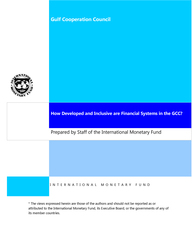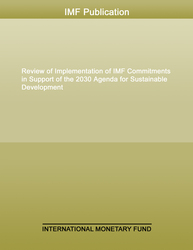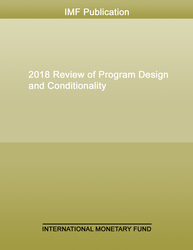
Gulf Cooperation Council Countries (GCC): How Developed and Inclusive are Financial Systems in the GCC?
Financial systems in the GCC have developed significantly over the last couple of decades, but there appears to be further room for progress.
READ MORE...
Volume/Issue:
Volume 2018
Issue 057
Publication date: December 2018
ISBN: 9781498310284
$5.00
Add to Cart by clicking price of the language and format you'd like to purchase
Available Languages and Formats
| English |
Prices in red indicate formats that are not yet available but are forthcoming.
Topics covered in this book
This title contains information about the following subjects.
Click on a subject if you would like to see other titles with the same subjects.
Finance , PP , GCC country , GCC bank , GCC asset manager , GCC government , private sector , GCC equity markets , GCC household , Financial sector development , Financial inclusion , Stock markets , Securities markets , Capital markets , Middle East , North Africa , East Africa , Africa , Global
Summary
Financial systems in the GCC have developed significantly over the last couple of decades, but there appears to be further room for progress. The development of bank and equity markets has been supported by a combination of buoyant economic activity, a booming Islamic finance sector, and financial sector reforms. As a result, financial systems have deepened and, overall, the level of financial development compares well with emerging markets. However, it still lags advanced economies and, other than for Saudi Arabia, appears to be lower than would be expected given economic fundamentals, such as income levels. Financial development in the GCC has relied to a large extent on banks, while debt markets and nonbank financial institutions are less developed and access to equity markets is narrow. The non-bank financial institutions—pension funds, asset management and finance companies, and insurance—remain small. Domestic debt markets are underdeveloped. While equity markets appear to be well developed by market size, they are dominated by a few large (and often public-sector) companies. GCC countries have made progress on financial inclusion, but gaps remain in some important areas. Access to finance for SMEs, women, and youth, in particular, appears relatively low. This may partly reflect social norms, low levels of participation of women in the labor market and private sector activity, and the high level of youth unemployment. Further financial development and inclusion is likely to be associated with stronger economic growth in the GCC countries. While there is uncertainty surrounding the empirical estimates in the paper, further progress with financial development and/or inclusion is likely to go hand-in-hand with stronger growth. The growth benefits, however, are likely to vary across countries depending on the current level of financial development and inclusion. To realize these growth benefits, reforms to strengthen access to finance for SMEs, women, and youth are needed. Addressing institutional weaknesses and promoting financial sector competition would help boost access to finance for SMEs. Reforms to enhance financial literacy and improve SME governance structures and insolvency frameworks are critical. Other reforms encouraging female and youth employment and the use of emerging technologies in finance also appear promising. Additional reforms to foster financial development should focus on developing debt markets and making stock markets more accessible to a larger pool of companies and investors. To grow domestic debt markets, the authorities should develop a government yield curve, seek to increase market liquidity through secondary market trading, and ensure requirements for private issuance are not onerous. Stock market reforms should focus on enhancing corporate governance and investor protection, removing restrictions on foreign ownership, and encouraging financial market competition. The latter would also help the development of non-bank financial institutions.
Copyright © 2010 - 2026
Powered by:
AIDC



